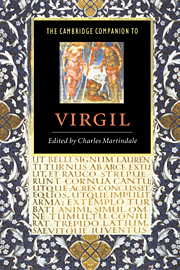Book contents
- Frontmatter
- Contents
- List of illustrations
- List of contributors
- Preface
- 1 Introduction: ‘The classic of all Europe’
- Part 1 Translation and reception
- Part 2 Genre and poetic career
- Part 3 Contexts of production
- Part 4 Contents and forms
- 16 Virgil's style
- 17 Virgilian narrative (a) Story-telling
- 17 Virgilian narrative(b) Ecphrasis
- 18 Approaching characterisation in Virgil
- 19 Sons and lovers: sexuality and gender in Virgil's poetry
- 20 Virgil and tragedy
- 21 Envoi: the death of Virgil
- Dateline compiled by Genevieve Liveley
- List of works cited
- Index
- Plates
17 Virgilian narrative (a) - Story-telling
from Part 4 - Contents and forms
Published online by Cambridge University Press: 28 May 2006
- Frontmatter
- Contents
- List of illustrations
- List of contributors
- Preface
- 1 Introduction: ‘The classic of all Europe’
- Part 1 Translation and reception
- Part 2 Genre and poetic career
- Part 3 Contexts of production
- Part 4 Contents and forms
- 16 Virgil's style
- 17 Virgilian narrative (a) Story-telling
- 17 Virgilian narrative(b) Ecphrasis
- 18 Approaching characterisation in Virgil
- 19 Sons and lovers: sexuality and gender in Virgil's poetry
- 20 Virgil and tragedy
- 21 Envoi: the death of Virgil
- Dateline compiled by Genevieve Liveley
- List of works cited
- Index
- Plates
Summary
The Aeneid has a story to tell, of how Aeneas after the fall of Troy reaches Italy with a small group of followers (Books 1-6) and there fights a war with some of the native inhabitants which ends in his victory (Books 7- 12). The plot of the Aeneid is quickly told, and not that long in the enactment, but its temporal outreach is enormous, from the prehistoric past to Virgil's own day and beyond (a time-scale Ovid will extend and parody in the Metamorphoses). Like all good stories, it also has much to say about story-telling itself, and the way we plot our ends in history: and at every point who speaks and who sees admits itself of more than one story.
Narrators
The narrator of the poem is a first-century BC Latin poet, whom it is easiest to call 'Virgil': he generally retains epic anonymity, but on occasions reveals his hand (e.g. 7.1, Caieta is buried litoribus nostris, 'on our shores', or 9.446-9, Nisus and Euryalus will be famous as long as the Roman father has power si quid mea carmina possunt, 'if my poems can (do) anything'). But from the beginning we meet other storytellers within the poem: the Muse who tells him the causes of events (1.8), the anonymous narrator who told Juno of the plot of the poem before it even began (1.20 audierat, 'she had heard . . . ' : compare Dido's desperate desire Iliacos iterum demens audite labores, 'to hear again in madness the Trojan labours', 4.78), the script of the Fates (1.260) based - or is it the other way round? - on a treatment by Jupiter himself, the Master Narrator of all.
- Type
- Chapter
- Information
- The Cambridge Companion to Virgil , pp. 259 - 270Publisher: Cambridge University PressPrint publication year: 1997
- 16
- Cited by



